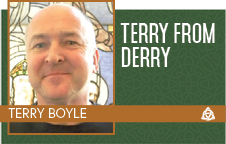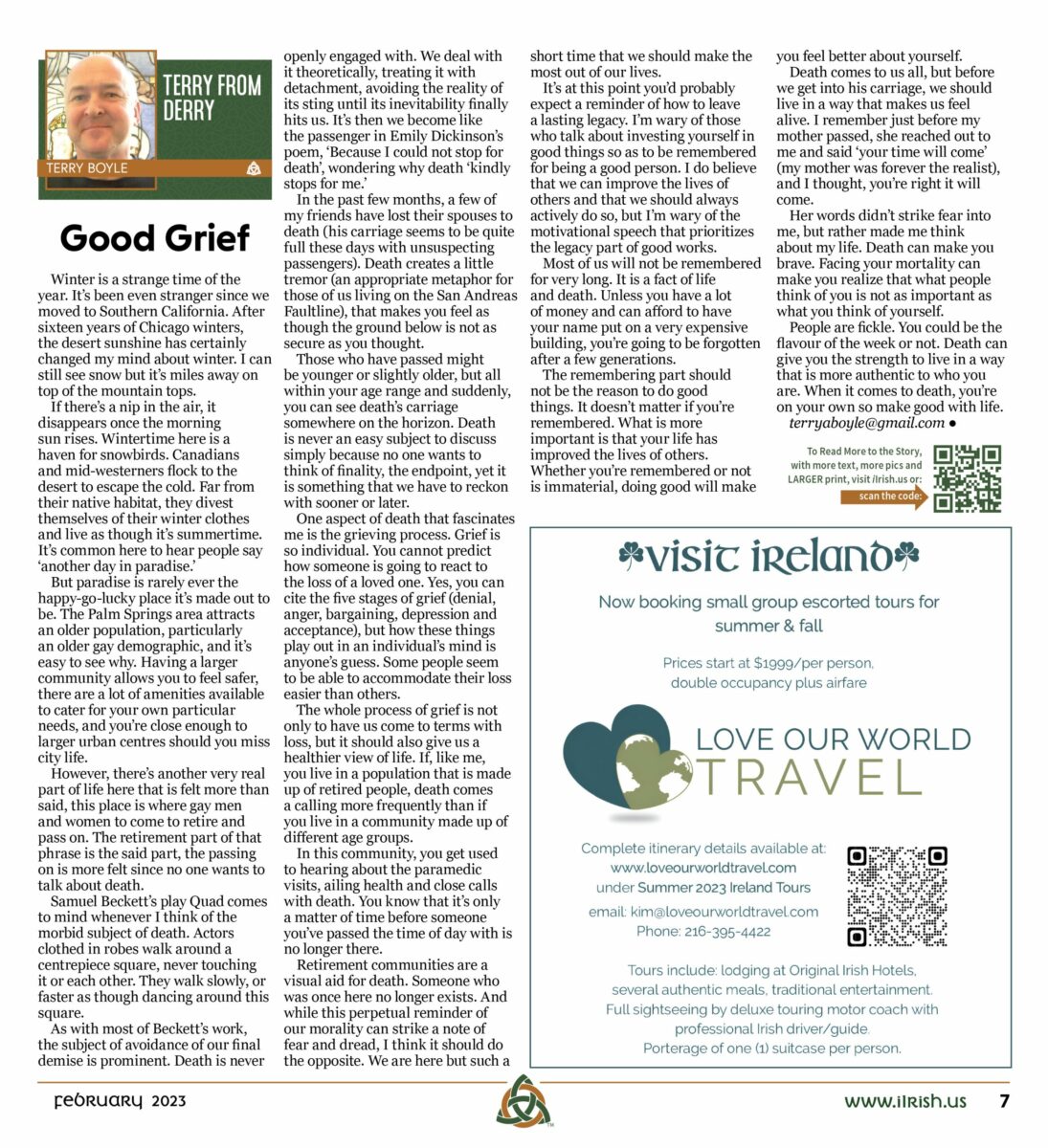
Terry from Derry: Good Grief
By Terry Boyle
Winter is a strange time of the year. It’s been even stranger since we moved to Southern California. After sixteen years of Chicago winters, the desert sunshine has certainly changed my mind about winter. I can still see snow but it’s miles away on top of the mountain tops.
If there’s a nip in the air, it disappears once the morning sun rises. Wintertime here is a haven for snowbirds. Canadians and mid-westerners flock to the desert to escape the cold. Far from their native habitat, they divest themselves of their winter clothes and live as though it’s summertime. It’s common here to hear people say ‘another day in paradise.’
But paradise is rarely ever the happy-go-lucky place it’s made out to be. The Palm Springs area attracts an older population, particularly an older gay demographic, and it’s easy to see why. Having a larger community allows you to feel safer, there are a lot of amenities available to cater for your own particular needs, and you’re close enough to larger urban centres should you miss city life.
However, there’s another very real part of life here that is felt more than said, this place is where gay men and women to come to retire and pass on. The retirement part of that phrase is the said part, the passing on is more felt since no one wants to talk about death.
Samuel Beckett’s play Quad comes to mind whenever I think of the morbid subject of death. Actors clothed in robes walk around a centrepiece square, never touching it or each other. They walk slowly, or faster as though dancing around this square.
As with most of Beckett’s work, the subject of avoidance of our final demise is prominent. Death is never openly engaged with. We deal with it theoretically, treating it with detachment, avoiding the reality of its sting until its inevitability finally hits us. It’s then we become like the passenger in Emily Dickinson’s poem, ‘Because I could not stop for death’, wondering why death ‘kindly stops for me.’
In the past few months, a few of my friends have lost their spouses to death (his carriage seems to be quite full these days with unsuspecting passengers). Death creates a little tremor (an appropriate metaphor for those of us living on the San Andreas Faultline), that makes you feel as though the ground below is not as secure as you thought.
Those who have passed might be younger or slightly older, but all within your age range and suddenly, you can see death’s carriage somewhere on the horizon. Death is never an easy subject to discuss simply because no one wants to think of finality, the endpoint, yet it is something that we have to reckon with sooner or later.
One aspect of death that fascinates me is the grieving process. Grief is so individual. You cannot predict how someone is going to react to the loss of a loved one. Yes, you can cite the five stages of grief (denial, anger, bargaining, depression and acceptance), but how these things play out in an individual’s mind is anyone’s guess. Some people seem to be able to accommodate their loss easier than others.
The whole process of grief is not only to have us come to terms with loss, but it should also give us a healthier view of life. If, like me, you live in a population that is made up of retired people, death comes a calling more frequently than if you live in a community made up of different age groups.
In this community, you get used to hearing about the paramedic visits, ailing health and close calls with death. You know that it’s only a matter of time before someone you’ve passed the time of day with is no longer there.
Retirement communities are a visual aid for death. Someone who was once here no longer exists. And while this perpetual reminder of our morality can strike a note of fear and dread, I think it should do the opposite. We are here but such a short time that we should make the most out of our lives.
It’s at this point you’d probably expect a reminder of how to leave a lasting legacy. I’m wary of those who talk about investing yourself in good things so as to be remembered for being a good person. I do believe that we can improve the lives of others and that we should always actively do so, but I’m wary of the motivational speech that prioritizes the legacy part of good works.
Most of us will not be remembered for very long. It is a fact of life and death. Unless you have a lot of money and can afford to have your name put on a very expensive building, you’re going to be forgotten after a few generations.
The remembering part should not be the reason to do good things. It doesn’t matter if you’re remembered. What is more important is that your life has improved the lives of others. Whether you’re remembered or not is immaterial, doing good will make you feel better about yourself.
Death comes to us all, but before we get into his carriage, we should live in a way that makes us feel alive. I remember just before my mother passed, she reached out to me and said, ‘your time will come’ (my mother was forever the realist), and I thought, you’re right it will come.
Her words didn’t strike fear into me, but rather made me think about my life. Death can make you brave. Facing your mortality can make you realize that what people think of you is not as important as what you think of yourself.
People are fickle. You could be the flavour of the week or not. Death can give you the strength to live in a way that is more authentic to who you are. When it comes to death, you’re on your own so make good with life.
Contact Terry at: [email protected]

Monthly newsmagazine serving people of Irish descent from Cleveland to Clearwater. We cover the movers, shakers & music makers each and every month.
Since our 2006 inception, iIrish has donated more than $376,000 to local and national charities.
GET UPDATES ON THE SERIOUS & THE SHENANIGANS!